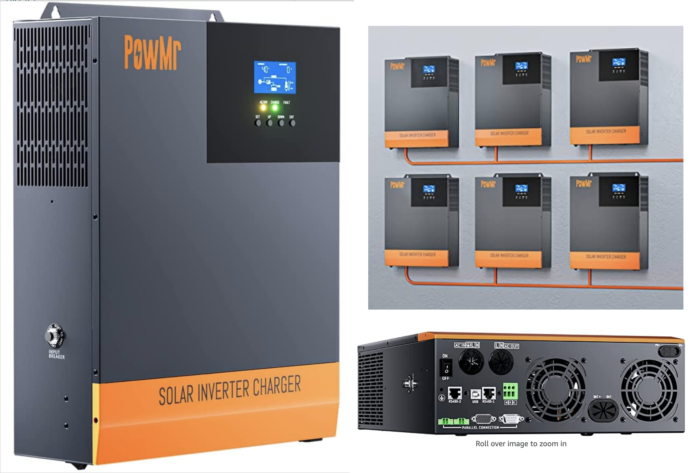PowMr 5600W Solar Hybrid Inverter 48V, 5.6KW Off Grid Pure Sine Wave Inverter 220V with 80A MPPT Charge Controller, for 48V Lead Acid / Lithium Battery, Solar Inverter Support Parallel.
About this item
- 【New Upgrade】5600W Solar Hybrid Inverter, which integrates solar energy storage, means charging energy storage and AC sine wave output. Full digital voltage and current double closed loop control, advanced SPWM technology, output of pure sine wave. With two output modes of utility bypass and inverter output, uninterrupted power supply.
- 【Battery Type】5.6KW Off Grid Solar Inverter Support lead-acid battery and lithium battery access, eight types of battery charging parameter preset(SLd, FLd, GEL, Ternary lithium, LFP battery); choose User-defined(all battery parameters can be set). Lithium batteries can be activated by PV solar or utility.
- 【Four Safe Charging Modes】48V MPPT Inverter support 4 charging modes: Only Solar/utility priority/solar priority/utility&solar hybrid charging. Three output modes can be set. PV priority/Utility priority/Battery priority, which can meet users’ different application needs.
- 【Electronic Function】5600W hybrid inverter features an energy saving mode function to reduce no-load losses; Intelligent variable speed fan of solar inverter efficiently dissipate heat and extend system life. Complete protections: short circuit protection/over voltage/under voltage protection/overload protection/reverse protection, etc.
- 【Parallel Function】This Off-Grid inverter Support parallel function, and can parallel up to 6 inverters in parallel! which means it can handle max 6000W*6 solar power and 5600W*6 ac power output system.
Differences between hybrid and non-hybrid solar inverters
Hybrid and non-hybrid solar inverters are different in several ways:
- Grid-tie vs off-grid: Non-hybrid solar inverters, also known as grid-tie inverters, are designed to connect to the utility grid and feed excess energy back into the grid. Hybrid solar inverters, on the other hand, are designed to work in both grid-tied and off-grid environments, allowing for energy storage and backup power.
- Battery integration: Non-hybrid solar inverters do not have the capability to integrate with batteries, while hybrid inverters can be connected to batteries to store excess energy for later use.
- Backup power: Non-hybrid inverters rely on the utility grid for backup power during outages. Hybrid inverters can provide backup power from the stored energy in the batteries when the grid is down.
- Cost: Hybrid solar inverters are typically more expensive than non-hybrid inverters due to the added functionality of energy storage and backup power.
- Power Quality: Hybrid inverters have better power quality as they can adjust the output of power to match the grid voltage and frequency.
- Self-consumption: Hybrid inverters allow for higher self-consumption of solar energy, as energy can be stored and used when needed, rather than being sent back to the grid.
Ultimately, the choice between a hybrid or non-hybrid solar inverter will depend on the specific needs and requirements of the solar energy system. If you want to have a backup power option, or if you are living in an area with a unreliable grid, a hybrid inverter would be a better option.



